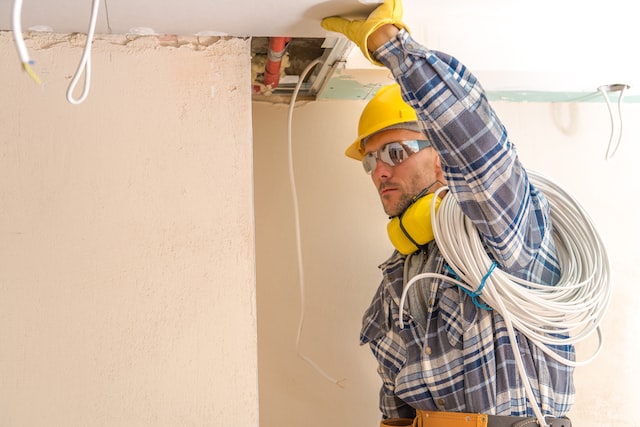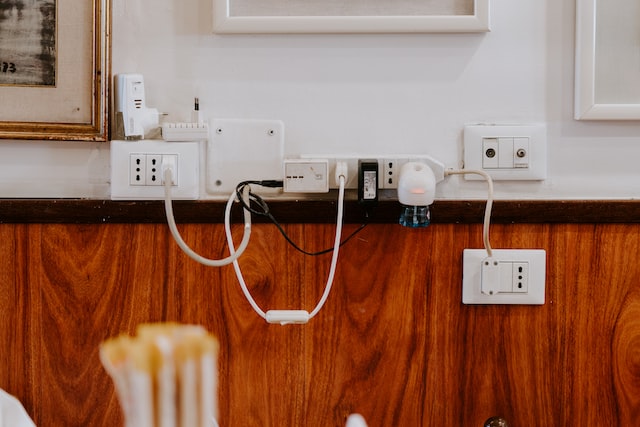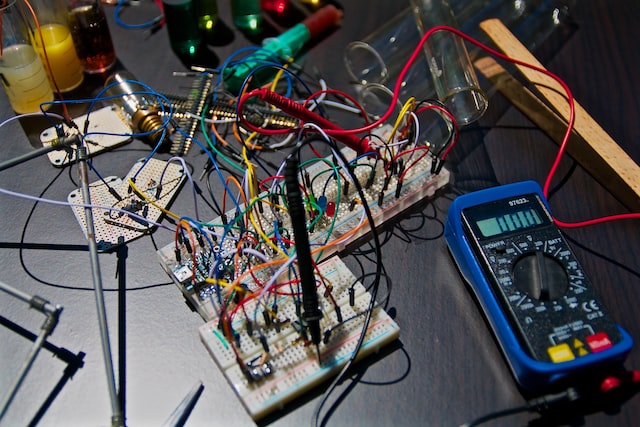Safety Tips From A Local Electrician

As a professional electrician in St Albans, we understand the importance of electrical safety in both residential and commercial settings. Electrical accidents can be devastating, resulting in serious injury or even death. That’s why we’re sharing some important electrical safety tips to help keep you and your loved ones safe.
Regularly checking for frayed or damaged cords and wires
It is vitally an important step in maintaining the electrical safety of your home or business. Damaged cords and wires can pose a serious fire hazard, as they can easily spark or short circuit, which can lead to a fire. Frayed or damaged wires may also be a sign of wear and tear, which can cause them to malfunction or fail altogether.
It is important to visually inspect all cords and wires in your home or business on a regular basis. Look for signs of fraying, cracking, or other damage on the exterior of the cord. If you notice any damage, it’s important to have them repaired or replaced as soon as possible.

It is also important to check the cords and wires that are hidden from view, such as those behind appliances or furniture, as they are also at risk of fraying or damage and can be easily overlooked.
It’s important to keep in mind that DIY repairs on cords and wires is not recommended, as it can be dangerous and may not be done correctly. It’s best to hire a professional electrician to repair or replace any damaged cords or wires, they will have the knowledge and the tools to handle a rewiring task safely and correctly.
Don’t overload electrical outlets
Overloading electrical outlets is a common yet dangerous mistake that can lead to a fire. It occurs when multiple devices are plugged into a single outlet, resulting in too much electrical current flowing through the circuit. This puts a strain on the outlet and the electrical wiring, which can cause the wires to overheat and potentially start a fire.
To prevent overloading, it is important to only use one plug per outlet. This means that if you need to plug in multiple devices, use a power strip or a surge protector to distribute the electrical load. This will help to prevent overloading and reduce the risk of a fire.
Power strips with built-in surge protection are also a great option, as they provide an additional layer of protection against power surges, which can cause damage to your devices. They also come with multiple outlets, allowing you to plug in multiple devices while keeping the electrical load balanced.
Another important thing to keep in mind when using power strips is to not plug high-powered devices such as space heaters, air conditioners, and microwaves into them, as they consume a lot of power and can overload the strip.

It’s also important to be aware of the amperage rating on the power strip, which indicates how much electrical current it can safely handle. Overloading the strip can cause it to overheat and potentially start a fire.
Overloading electrical outlets is a dangerous practice that can lead to a fire. To avoid overloading, it is important to only use one plug per outlet and use power strips with built-in surge protection to distribute the electrical load. It is also important to be aware of the amperage rating of power strips and not plug high-powered devices into them.
Keep flammable materials away from electrical equipment
Keeping flammable materials away from electrical equipment is a crucial step in maintaining the electrical safety of your home or business. Flammable materials, such as paper, curtains, and bedding, can easily catch fire if they come into contact with a spark or heat source. This can lead to serious fires, which can cause damage to your property and put lives at risk.
It’s important to be aware of the potential fire hazards in your home or business and to take steps to minimise them. This includes keeping flammable materials, such as paper, curtains, and bedding, away from electrical equipment, such as outlets, light switches, and appliances. This will help to reduce the risk of a fire starting in the event of a spark or heat source.
It is also important to keep flammable materials away from heat-producing appliances such as ovens, stoves, and heaters. These appliances can produce a lot of heat and can easily ignite flammable materials if they are placed too close to them.
Don’t use electrical equipment that is damaged or has exposed wires
Using electrical equipment that is damaged or has exposed wires can be extremely dangerous, as it can lead to electrical shock, fires or other hazards. It is important to be vigilant and to regularly inspect your electrical equipment for signs of damage or exposed wires.
If you notice any damage or exposed wires on your electrical equipment, it’s important to stop using it immediately. This includes things like frayed cords, cracked or broken plugs, and loose or missing wires. Any of these issues can be a sign that the equipment is not safe to use and could pose a serious risk to your safety.
When you come across any damaged equipment, it’s important to have it repaired or replaced as soon as possible by a professional electrician. They have the knowledge, skills, and tools to repair or replace the equipment safely and correctly.

Always use the right fuse for your electrical equipment
Using the correct fuse for your electrical equipment is crucial to ensure the safety of your home or business and to prevent fires. A fuse is a safety device that is designed to protect your electrical equipment from damage due to power surges or overloads. It is placed in the electrical circuit, and when the current flowing through the circuit exceeds the rated capacity of the fuse, it will “blow” or open the circuit, breaking the flow of electricity and preventing damage to your equipment.
However, using the wrong fuse for your electrical equipment can cause a fire. If the fuse is not rated for the correct amperage, it may not be able to handle the amount of current flowing through the circuit, which can cause the wires to overheat and potentially start a fire.
It’s important to always use the correct fuse for your electrical equipment. Each piece of equipment has a specific amperage rating that is listed on the equipment or in the owner’s manual. It’s important to refer to this rating and use a fuse that is rated for the same amperage or higher.
Electrical safety should be a top priority for every homeowner, business owner, and tenant. By following these tips and hiring professional electricians in St Albans, you can make sure that your property is safe and sound.




